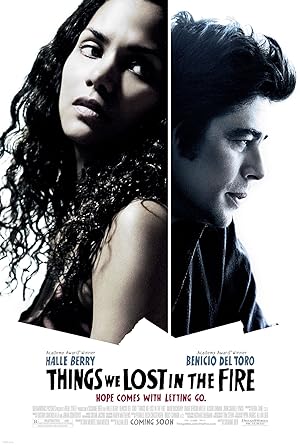Things We Lost in the Fire is about a widow, played by Halle Berry, who is distraught over facing life without her husband, played by David Duchovny, so she welcomes his best friend, a drug addict, played by Benicio Del Toro, into her home as a way of keeping her husband’s memory alive while resenting him for not being her husband.
Things We Lost in the Fire only works if you enjoy the actors’ performances otherwise it is one of those stories that only happen in films. The wife and husband are deeply in love, wealthy and healthy. He is a perfect father. The husband is also extremely kind-he visits his friend in a bad neighborhood and intervenes when men beat their wives. When the husband dies, there are no practical difficulties, just psychological. The most realistic part of Things We Lost in the Fire is the fact that even if Del Toro were a drug addict, you probably would still let him into your house because come on!
Things We Lost in the Fire feels like it belongs to a genre that sets up a scenario to see if a widow can get over and find love while not being disloyal to the memory of the widow’s first love. It is the opposite of a rom com. A rom tragedy works in the following fashion: there is a perfect romantic relationship, the movie kills one of the two, an ideal widow gets to move on, meet the perfect person and have another perfect, but different romantic relationship without being an awful person by leaving the prior relationship. Basically the deceased spouse is the McGuffin, and it is always a little gross. Things We Lost in the Fire just barely avoids fully going down that road, but fairly early in the film, it does explicitly ask if the drug addict can get his friend’s perfect life without doing anything bad that would damage his friendship.
Things We Lost in the Fire does get some things right, mostly due to the cast’s performances. Berry and the actors who play her family get the frantic energy and response reminiscent of a mourning bridezilla’s request and her retinue’s efforts to fulfill her requests. Berry does anger well, but when they have her do things that seem a little too close to Ruth and Boaz or her premiere in Jungle Fever, Things We Lost in the Fire goes off the rails.
Del Toro is really the anchor of Things We Lost in the Fire, particularly his performance with the two young actors, Alexis Llewellyn and Micah Burke. His first appearance in Things We Lost in the Fire is a type of living memorial to their father-he retains their father’s memory and instantly has credibility. Because he has no life and wants to keep his best friend’s memory alive, he permits himself to be used by his friend’s family and friends while also recognizing how absolutely twisted the whole scenario is and trying to bring it to their attention while not bursting the bubble of his friends memory which everyone is trying to keep afloat. His still moments when he loses himself in music or drug highs are the best scenes in the film. Still Things We Lost in the Fire is manipulative by setting up a scenario where the family must feel obligated to save Del Toro’s character from drug use because otherwise it will be like killing the father/husband again. While I was happy to see The Walking Dead’s Cheese Maker as a humorous interlude, it adds to the rom tragedy nature of the film, which cheapens the nuanced performances.
I have mixed feelings about the structure of the film. If the narrative were linear, perhaps it would feel more like a rom tragedy as opposed to a drama, but I am not sure that the nonlinear order of flashbacks was really necessary. The flashbacks effectively evoke how time and memory during times of grief get jumbled and allows the viewer to understand the loss by getting to know the deceased by showing, not telling.
Things We Lost in the Fire features amazing performances and depicts grief more effectively than most American films, but ultimately is too close to the distasteful genre that I call the rom tragedy. If you are a fan of any of the actors in Things We Lost in the Fire, definitely check it out otherwise you may find yourself a little disgusted by the emotional manipulation of the narrative.
Stay In The Know
Join my mailing list to get updates about recent reviews, upcoming speaking engagements, and film news.





